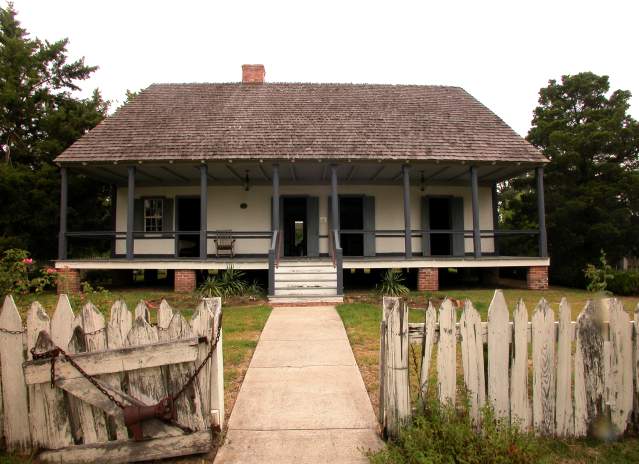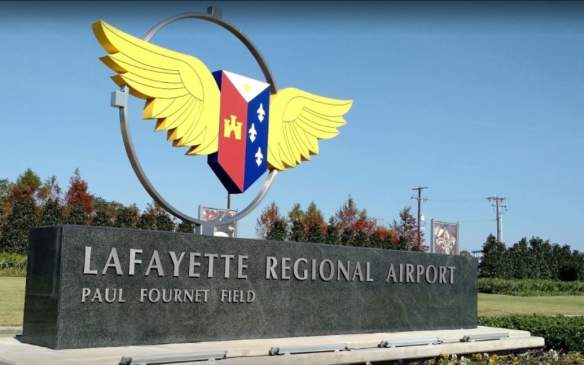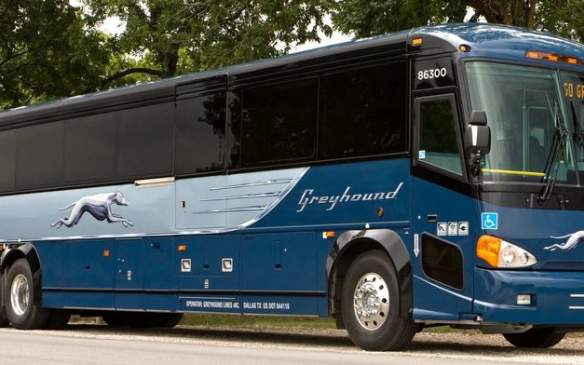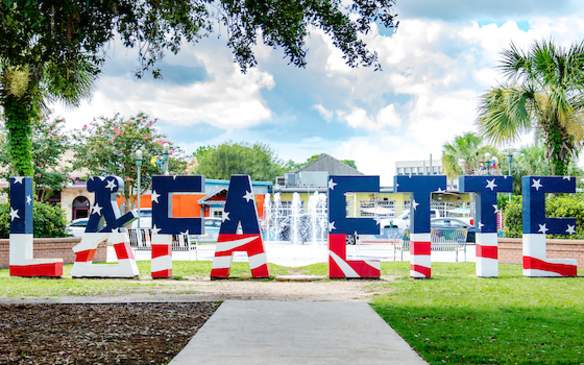Your browser is not supported for this experience.
We recommend using Chrome, Firefox, Edge, or Safari.
Language
Exiled from their native homeland of Nova Scotia in 1755, the Acadians wandered aimlessly along the Atlantic seaboard for years before settling in the rich fertile soils of south Louisiana. The 6,000 Acadians who refused to swear allegiance to the British crown were punished for their disloyalty with destruction of their homes and expulsion from their homeland.
This horrendous voyage marked 30 years of hardship and humiliation for a proud group of people. At each location of disembarking along the Atlantic Coast, these refugees were welcomed by open hostility. Through the generosity of the Spanish Government, Charles III, they were transported to south Louisiana where they settled on friendly land. Here, they established small farms along the swamp and prairie region of the Mississippi River, Bayou Teche, Bayou Lafourche and other locations in the southern part of the state. For almost 200 years they remained in isolation because of inaccessibility to this region. Even under Spanish rule, a large majority of the colonists continued to speak French.
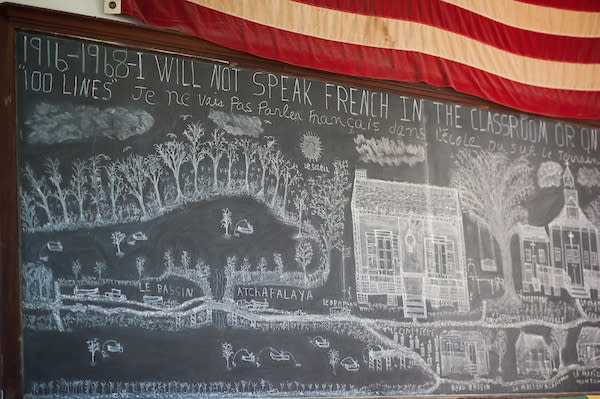
A distinct culture and a dialect known as "Cajun" French was born. Cajun French began in Nova Scotia between 1604 and 1756 and traveled to Louisiana where it matured and further developed. It is the only modern North American language and has undergone many linguistic changes over the years.
There have been many speculations as to why Cajun French has survived and attained dominance for over 200 years. Many conclude that the geographic isolation of the Acadian settlements, the close-knit family structure and the lower socioeconomic status of the group has contributed to its endurance.
Several factors contributed to the changes and almost extinction of the language. In the 1930's, Governor Huey P. Long began a process to bridge the swamplands and lowlands with a network of roads bringing an end to the Acadians' isolated existence. Another set back for the language occurred in the public school system when children were coerced by punishment to abandon their language and speak only English. Soon, this generation became ashamed of their language and were convinced of their cultural inferiority.
Through the efforts of the Council for the Development of French in Louisiana (CODOFIL), a reawakening of Cajun pride has emerged. CODOFIL has been responsible for protecting and promoting the French heritage of Louisiana through encouraging the teaching of French in elementary schools, student and teacher exchanges, the organization of national and international meetings, festivals and radio and television programs in French. Today through CODOFIL's involvement, Cajun French is spoken proudly.
More than 260,000 Louisianans speak a form of French either brought to New Orleans by French nobility or to the bayous and prairies by Acadian immigrants. Research also shows that in Louisiana, the older you are the more likely you are to speak French.
People who listed their home language as French, Cajun or French Creole make up two-thirds of the 391,994 Louisiana residents who told the Census Bureau in 1990 that they do not speak English in their homes. Louisiana residents make up the 13.6 percent of the 1.9 million people who speak one of those three French dialects around the country. Those three groups account for 6 percent of the 31.8 million people nationwide who speak a language other than English at home.
Other home languages of Louisiana residents include: Spanish, 72,173 (18.4 percent statewide, 54.4 percent nationwide); Vietnamese (many settled here and continue their trade as fishermen), 14,352; German, 8,588; Italian, 4,933; Chinese, 4,485; Korean, 2,607; Arabic, 2,419; Tagalog, 2,607; Hindi, 1,993; Thai, 1,752; Greek, 1,391; Japanese, 1,385; Persian, 780; Koasati Indians (Coushatta), 229; Gaelic, 126; Irish, 91; Scottish, 35; Bulgarian, Nepali and Fijian, 3 each; Sebuano (spoken on the Philippine island of Sebu), 4; Choctaw and Kusaiean, 6 each; Romany (ancient Gypsy language), 7; and Apache, 8.
French Phrases
Common expressions you might hear in Lafayette, LA. This list was made in collaboration with Télé-Louisiane. To read more about French in Louisiana, read their guide “An Introduction to Louisiana French.”
- Allons (Al lohn): Let's go. Allons à Lafayette; “Let’s go to Lafayette.”
- Lâche pas la patate (Losh pa la pa tot): Don't let go of the potato or don't give up (a testament to the enduring spirit of the Cajun and Creole peoples.
- Andouille (ahn-do-ee): A spicy country sausage used in Gumbo and other Cajun and Creole dishes. Asteur (ah-stir): While they might say maintenant in France, in North America, especially Louisiana, francophones tend to say asteur, which means now. It’s a contraction of à cette heure, which means, “at this hour.”
- Bayou (bi-yoo): A slow-moving stream, many of which crisscross Louisiana.
- Bon appétit (bon a-pet-tite): Literally, “good appetite”; meant to reflect “Enjoy!”
- Boucanière (boo-kahn-yair): A smokehouse where Cajuns and Creoles give flavor to Louisiana’s famous array of sausages like andouille.
- Boucherie (boo-shuh-ree): A community butchering in the fall that historically involved several families contributing the animal(s)—usually pigs—to be slaughtered. Each family helped to process the different cuts of meat, like sausage, ham, boudin, chaudin, and head cheese. Each family took home their share of the yield. Today, communities still host boucheries, but they are mostly symbolic, recreational, or meant to raise money for charity.
- Boudin (boo-dan): Hot, spicy pork mixed with onions, cooked rice, herbs, and stuffed in sausage casing.
- Bougre (boog): A man or guy; used to address a male friend.
- Bourré (boo-ray): French for "stuffed”, it is the name of a Cajun card game which requires the loser of a hand to stuff the pot with chips.
- Ça c’est bon (Sa say bohn): That’s good. Our music? Ça c’est bon. Our food? Ouais, ça’ cest bon itou.
- Ça va bien (Sa va byan): It’s going well. A reponse to the question Ça va? or Comment ça va?
- Cadien (ka-jun): The word Cadien is a shortened version of Acadien, a francophone ethnic group from Nova Scotia, Canada, who settled in Louisiana in the late 18th century.
- Cayenne (kie-yen): A hot pepper that is dried and used to season many Louisiana dishes.
- C’est tout (Say too): That’s all.
- Chaoui (sha-wee): The Louisiana French word for “racoon,” derived from an Indigenous language.
- Chanter (shan-tay): To sing. Families across Lafayette and Acadiana teach their kids how to sing en français, making Cajun and Creole music is one of the places our French is most vibrant and present to this day.
- Charrer (sha-ray): To chat, to talk. Many of our pastimes in Louisiana involve “visiting” with each other. So you can always find a group of Louisianans aprés charrer.
- Chaudière noire (sho-dee-air nwour): A cast iron pot, often used in Louisiana cooking.
- Cher (Sha): Dear (a term of endearment).
- Chevrette (she-vret): Shrimp.
- Chez nous-autres (shay noozawt): Our home, often referring to one’s place of residence or a particular region or Louisiana itself.
- Ciprière (sip-ree-air): A cypress swamp. The Atchafalaya River Basin near Lafayette is home to one of the biggest cypress swamps in the world.
- Cochon (koe-shawn): A pig, one of the main ingredients of many of Louisiana’s beloved dishes like boudin and cracklins.
- Cocodrie (ko-ko-dree): Alligator. Spend a day kayaking around Lake Martin, and you’ll see plenty of alligators lurking between the cypress trees.
- Comment les haricots? (komen lez airee-kow): Literally, “how are the green beans?”; used to express, “how are you?”
- Côteau (koe-tow): A hill or ridge; land that doesn’t flood. In Louisiana’s flat delta lands, these bumps in the terrain have always been where settlements popped up to avoid regular flooding.
- Couche-Couche (koosh-koosh): A popular breakfast food, made by frying cornmeal and topping it with milk and/or cane syrup.
- Courir (kou-rire): The traditional Mardi Gras celebration in Cajun and Creole country where participants run (courir) in the prairie after chickens and assemble the necessary ingredients for a communal gumbo.
- Courtbouillon (coo-boo-yon): A rich and spicy tomato-based soup or stew made with fish filets, onions, and sometimes mixed vegetables.
- Créole (cree-ol): Originally meant to describe anyone born in the Louisiana colony and of francophone culture, including Africans, Acadians, the French, the Spanish, and Germans. The term has expanded and now embraces a type of cuisine, a style of architecture, the culture of this community, and the unique language spoken by many of its members.
- Danser (don-say): To dance. Because you can’t have Cajun and Zydeco music without passing a good time on the dance floor at a dance hall or one of our many festivals like Festivals Acadiens et Créoles in October.
- Envie (anvee): To desire something, like a cold drink on a hot Louisiana day.
- Étouffée (ay-too-fay): A succulent, tangy tomato-based sauce. A smothered dish usually made with crawfish or shrimp. Crawfish and shrimp étouffées are Louisiana specialties.
- Faire la veillée (fair la vay-yay): To go visit friends and family on their front porch. The namesake for the only French news show currently on TV..
- Fais-do-do (Fay doe doe): A dance. Literally “go to sleep” – a phrase whispered by Louisiana francophones to their children so the parents could join in the dancing.
- Filé (fee-lay): The French, who learned from the Choctaw the practice of grounding sassafras leaves to put in soups, called the powder, filé. In French, this means “thread.” Just a spoonful of filé can thicken a dish like gumbo so much, its broth can become stringy or thread-like.
- Fricassée (free-kay-say): A stew made by browning, then removing meat from the pan, making a roux with the pan drippings, and then returning meat to simmer in the thick gravy.
- Gombo or gumbo (gum-boe): A robust, roux-based soup sometimes further thickened with okra or filé. There are many variations, which can include a host of ingredients like seafood, fowl or an array of vegetables.
- Grègue (greg): A coffeepot. Cajuns and Creoles love to visiter or faire la veillée, and you can’t visit without a cup of coffee.
- Jambalaya (jum-bo-lie-yah): Louisiana chefs "sweep up the kitchen" and toss just about everything into the pot. A rice dish with any combination of beef, pork, fowl, smoked sausage, ham, or seafood, as well as celery, green peppers and often tomatoes.
- Joie de vivre (Jhwa da veev): Joy of living.
- Lagniappe (Lahn yop): Something extra.
- Laissez les bons temps rouler (Lay say lay bohn tohn roo lay): Let the good times roll.
- Manger (mawn-jay): To eat. In Louisiana, nous-autres, on aime manger; “we love to eat.”
- Maque choux (mock-shoo): A Native American dish made by scraping young corn off the cob and smothering the kernels in tomatoes, onion, and spices.
- Maringouin (mare-ain-gwen): Mosquito. Louisiana has plenty of these pesky bugs—but we don’t let that stop us from having a good time.
- Merci (Mare see): Thanks.
- Nonc (Nonk): Uncle.
- Ouaouaron (wa-wa-rawn): A bullfrog. If you listen to the sounds of a swamp at night, you’ll probably hear a bull frog groan, which sounds just like the name.
- Pain perdu (pan-pear-doo): Means "lost bread"; a breakfast treat made by soaking stale bread in an egg batter, then frying and topping with cane syrup or powdered sugar.
- Padna (pod-na): A friend, taken from the English word, “partner.”
- Pâquer (pok-kay): A game played at Easter where people knock eggs together. If your egg breaks, you lose the match.
- Pauvre tite bête (Pove teet bet): Poor little thing.
- Piastre (pee-ohss): A dollar.
- Pirogue (pee-row): A local style of canoe with a flat bottom and low sides. Years ago, people got around the swamps with un piroque and a push pole.
- Quoi ça dit? (quoi sa dee): Literally, “what that says.”; used to express, “what’s up?”
- Quoi t’es après faire? (quoi tay ah-pray fair): What are you doing?; used to inquire what someone is up to.
- Rôder (row-day): To run the roads; to roam around.
- Roux (rue): Base of gumbos or stews; made of flour and oil mixture.
- Sauce piquante (saws-pee-kawnt): Means "spicy sauce"; is a spicy stew. Allons cuire une sauce piquante à soir; “Let’s cook a sauce piquante this evening.”
- Soigne-toi (swain twa): Take care of yourself.
- Sou (soo): Cent.
- Tante (taunt): Aunt.
- Tasso (tah-soh): A Native American practice that includes drying strips of spiced pork or beef which are smoked like jerky and used to flavor many dishes.
- Tout quelqu’un (two kek-kun): Everyone. During the fall, Louisiana’s festival season, tout quelqu’un est après danser; “everybody is dancing.”
- Tout quelque chose (two kek-shows): Everything.
- Traiteur (trait-your): In Louisiana’s francophone and creolophone communities, a traiteur is a healer who uses prayers and medicinal plants to treat their neighbors.
- Un tit brin (uh tee bren): A little bit.
- Vaillant (vie-yant): Nice.
- Vous-autres (voo-zawt): Y’all. Because even in French, in the South, nous-autres, on dit vous-autres; we say y’all.
- Zydeco (zi-de-co): This Creole music gets its name from les haricots, or “the beans.” It’s infectious rhythm is made possible by the accordion, drums, guitar, and, importantly, the wash board.
French Tables
Are you currently learning French and looking to practice speaking it? Are you looking to brush up on the French you learned in your youth? If the answer is yes, then look no further! We've compiled a list of places in Acadiana and beyond of French Tables to help you on your French-speaking journey. For a complete list of French Tables around the area click here.
Don't see a French Table you frequent in the list below? Click here to let us know, and we'll add it to the list.
Lafayette
Dwyer's Café
323 Rue Jefferson, Lafayette, LA 70501
Wednesday mornings at 7:00 a.m.
Lester Gauthier, legauth@bellsouth.net
Blue Moon Saloon
215 E Convent St, Lafayette, LA 70501
2nd Wednesday of the month from 6:00 - 8:00 p.m.
(337) 234-2422
La Tente Française
Lafayette Farmer’s and Artisan’s Market at Moncus Park
2913 Johnston St, Lafayette, LA 70503
Every Second Saturday of the month at 9:00 a.m.
Kevin Domingue, french@kevindomingue.me
Bar à Tapas Pamplona
631 Jefferson St, Lafayette
Every Friday at noon
Pétanque at Girard Park
Girard Park, 500 Girard Park Dr, Lafayette
Second and fourth Sunday of every month from 2:00 - 4:00 p.m. (fall and winter); 4:00 - 6:00 p.m. (spring & summer)
Mike (337) 534-9930.
Petroleum Club
111 Heymann Blvd, Lafayette
Second Tuesday of every month from 5:30 - 7:00 p.m.
Ginger Latiolais | galatiolais@gmail.com | 337-962-5709
Vermilionville's La Cuisine de Maman
300 Fisher Rd., Lafayette, LA 70508
2nd Saturday of the month 9:00 - 9:30 a.m.
Valsin Broussard House
408 W. Main St., Broussard
2nd Friday of every month from 8:30 - 10 a.m.
(337) 445-3478
Arnaudville
Arnaudville Table Francaise
Arnaudville Community Center
291 Guidroz St, Arnaudville
Last Saturday of the month from 9:30 - 11:30 a.m.
Breaux Bridge
Messe en français/French Mass
St. Bernard Catholic Church
204 N Main St, Breaux Bridge,
2nd Saturday and Sunday of the month at 8:00 a.m.
Erath
La Table Française d’Erath
Erath City Hall-115 W Edwards St., Erath, LA 70533
This French Table is held weekly on every Friday at 11:00am.
(337) 254-8522
Eunice
Eunice Table Française
220 S C C Duson St, Eunice, LA 70535, USA
Every Wednesday morning 9:30-10:30 AM
(337) 457-8499
New Iberia
Cadiens du Teche Cajun Dance
La Louisiane Banquet Hall
5509 Hwy. 14, New Iberia
Every third Wednesday of the month from 7:00 - 9:30 p.m.
(337) 258-1876
Bayou Teche Live French Table
Cane River Pecan Company
254 W Main St, New Iberia
Thursdays at 8:30 a.m.
rommo1@aol.com | (337) 519-7942
Opelousas
Le Vieux Village
828 E Landry St, Opelousas, LA 70570
Last Wednesday of the Month 8:30 - 9:30 a.m.
337-948-6263
Rayne
The Bernard House
Corner of The Blvd and Oak Street across from the Rayne Police Station
Thursdays 9:30 a.m.
Scott
Begnaud House Heritage Visitor Center
110 Benoit Patin Rd., Scott, LA 70583
1st and 3rd Tuesday of the month from 1:00 - 2:00 p.m.
337-269-5155 | 337-269-5697
St. Martinville
Longfellow-Evangeline State Historic Site
1200 N Main St.
Third Saturday of every month from 2:00 to 3:30 p.m.
(337) 394-3754
Inspiration Journal
Lafayette's blog showcasing the food, music, culture and history at the heart of Cajun & Creole Country.
See All PostsLafayette Weekly
A Message From Lafayette Travel This week’s Lafayette Weekly is bittersweet for everyone who knew and loved Chris Stafford and his music. Chris transcended the label of…
Eight Reasons Why Lafayette Is The Ultimate Destination for Your Next Meeting or Convention
Are you searching for the perfect location for your next meeting or convention? Look no further than Lafayette, Louisiana! Known as the Happiest City in America, Lafayette offers a…
Blu Basil
Dang Nguyen has one of those origin stories that makes you want to try his food. He's a Vietnamese American who owns and operates two Lafayette restaurants: Saigon Noodles on…
Burgersmith
In the olden days, when you wanted something handcrafted, you went straight to the source. Burgersmith, a play on the word blacksmith, takes the concept of handcrafted and applies…
Getting to Lafayette
The city of Lafayette, LA is located in the center of Lafayette Parish at the intersection of I-10 and I-49 between New Orleans and Houston and only 35 miles north of the Gulf of Mexico.
